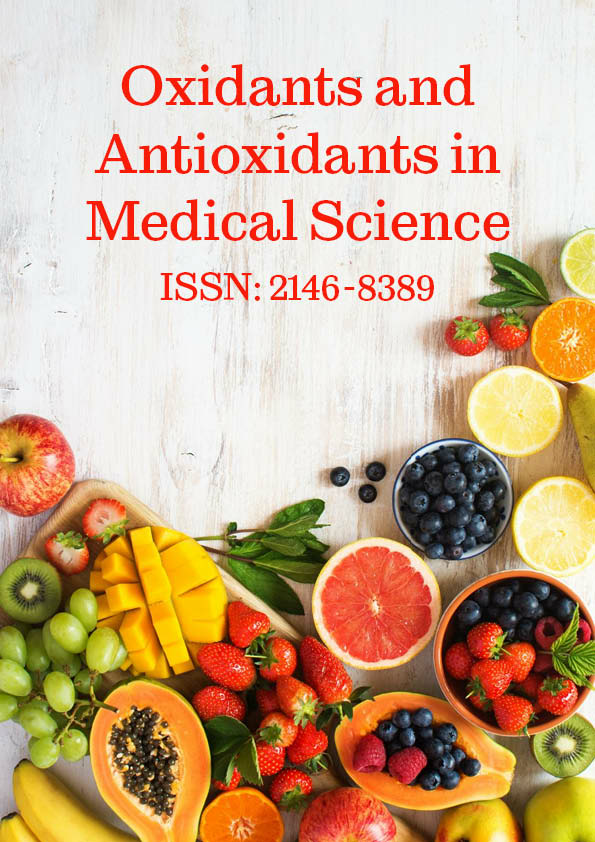Opinion Article - Oxidants and Antioxidants in Medical Science (2022)
The Important Role of Antioxidants in Alzheimers Disease
Ibrhim Eiz*Ibrhim Eiz, Department of Biochemistry, University of Tehran, Tehran, Iran, Email: ibrzie@gmail.com
Received: 08-Apr-2022, Manuscript No. EJMOAMS-22-60052; Editor assigned: 11-Apr-2022, Pre QC No. EJMOAMS-22-60052 (PQ); Reviewed: 25-Apr-2022, QC No. EJMOAMS-22-60052; Revised: 30-Apr-2022, Manuscript No. EJMOAMS-22-60052 (R); Published: 07-May-2022
Description
Alzheimer’s disease is a brain disorder that gradually impairs memory and thinking skills and, ultimately, the ability to perform simple tasks. For most people with the disease those with late onset symptoms begin to appear in their 60’s. Premature Alzheimer’s occurs between the ages of 30 and 60 and is less common. Alzheimer’s disease is the most common cause of dementia in older adults.
Alzheimer’s mutations usually begin in the part of the brain that affects learning. As Alzheimer’s progresses in the brain it leads to more serious symptoms, including confusion, mood swings and behavioural changes, deep confusion about events, time and place, baseless allegations about family, friends and trained caregivers, severe memory loss and behavioural changes and difficulty in speaking, swallowing and walking.
Vitamin E
Experimental models have shown that vitamin E supplementation, by reducing oxidative stress, may be a good way to improve dementia and memory. In addition, a combination of vitamin E and other antioxidants or anti-inflammatory compounds may increase its effectiveness.
Vitamin E is the most promising antioxidant of peroxyl radicals. It can work on lipid-soluble membrane lipoproteins and low-density lipoproteins. In addition, it eliminates free radicals present in the red blood cell membrane and prevents the spread of lipoperoxidation. In addition, α-tocopherol is the most abundant form of vitamin E with high bioavailability in human tissues. Vitamin E may be helpful in counteracting the increased expression of alpha-tocopherol (α-TTP) protein transfer in the brain of a patient suffering from Alzheimer’s Disease (AD).
Glutathione
Glutathione also plays a key role in protein and DNA synthesis, cell cycle regulation, and the storage and transport of cysteine. It has the ability to release lipid peroxidation products such as acrolein, 4-hydroxy-2-nonenal, and others. It is used to store thiol redox cells, detox electrophiles, and iron, and to protect against oxidative stress. It can also form metal structures that reduce iron toxicity and make it easier for them to escape further from the body. Recently, it was reviewed that cholesterol-mediated depletion of mitochondrial glutathione is associated with an increase in Aβ-induced oxidative stress in mitochondria. Introduction of glutathione ethyl ester in transgenic mice showing high levels of sterol regulatory element-binding protein has been shown to prevent neuroinflammation and neuronal damage. In addition, recent research suggests a redox pathway for glutathione antioxidant responsible for regulating mitochondrial energy in axons. However, the overall mechanical overview of the special role of glutathione in AD is not yet clear.
Molecular hydrogen
The hydrogen molecule is also an antioxidant that can alter the expression mechanism of Keap1-Nrf2-ARE and reduce inflammation. It has a potential role in the selective reduction of hydroxyl radicals involved in the breakdown of proteins, nucleic acids and leads to lipid peroxidation, which is also a reported factor in AD. It has been reported that cellular hydrogen administration increases the survival of short-term Drosophila and life expectancy.
Curcumin
Many of the desirable properties are based on the neuroprotective drug curcumin, which includes antioxidant, anti-protein aggregates, and anti-inflammatory functions. It has been hypothesized that curcumin reduces inflammation, oxidative damage, and dementia in mice when Aβ-toxin affects their central nervous system. Curcumin contains a number of free radical detoxifiers, where it directs NO- based radicals to remove them, which helps prevent lipid peroxidation.
Copyright: ©2022 The Authors. This is an open access article under the terms of the Creative Commons Attribution NonCommercial ShareAlike 4.0 (https://creativecommons.org/licenses/by-nc-sa/4.0/). This is an open access article distributed under the terms of the Creative Commons Attribution License, which permits unrestricted use, distribution, and reproduction in any medium, provided the original work is properly cited.







